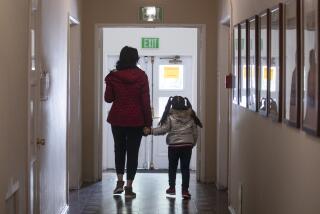A rotating panel of experts from the worlds of philosophy, psychology and religion offer their perspective on the dilemmas that come with living in Southern California.
- Share via
Today’s Question: After arrests in domestic violence cases, authorities often order counseling for the abusers in an attempt to change their behavior. But studies show that many victims--usually wives who feel trapped by emotional/financial considerations--remain in abusive relationships or wind up in new, but similar situations. Are we spending too much effort to change the behavior of abusers and not enough requiring help for the victims?
Garth Kasimu Baker-Fletcher
Associate professor of Christian ethics/religion, School of Theology at Claremont/Claremont Graduate School.
Society cannot afford to neglect the counseling needs of the abused or the abuser. Traditionally, society did not condemn abusive behavior as illegal, immoral or psychologically destructive. Recent gains in the legal status of women have compelled society to slowly change its traditional “hands off” attitude to intervene on the abused person’s behalf. Abused persons must be given psychological counseling and peer group support. Abusers, however, require healing and transformation as well. Both sides require long-term peer support to radically change their behavior and relationship choices.
Orli Peter
Associate professor of psychology; director, Marriage, Family and Child Counseling Program, Mount St. Mary’s College.
Victims of abuse have not committed a crime, so they should retain the right to refuse psychological treatment. However, treatment should be available to all victims, both to alleviate the traumatic consequences of personal violence and to support their transition to a safer life--whether they leave their abusive partners or remain while the perpetrator receives treatment. Only some victims need longer treatment to enable them to choose and form non-abusive relationships. Increased treatment for victims should certainly not be paid for by reducing treatment of perpetrators. Coupled with a minimum jail term of six months, mandated psychological treatment helps reduce their violence.
Rabbi Elliot N. Dorff
Rector and professor of philosophy, University of Judaism. His Rabbinic ruling on domestic violence was recently adopted by Conservative Judaism’s Committee on Jewish Law and Standards.
Domestic violence violates not only Jewish laws against assault but also those that demand honor and respect for parents and spouses and care for children. Victims of domestic abuse often find it hard to extricate themselves from the situation, but they have a duty to avoid injury and to help the other members of their family to do so. As a community, we need to support them in that through shelters, legal aid and programs of rehabilitation. We also need to help abusers do teshuvah, the Jewish process of “return” to proper behavior, but saving innocents from harm takes precedence.
More to Read
Sign up for Essential California
The most important California stories and recommendations in your inbox every morning.
You may occasionally receive promotional content from the Los Angeles Times.













